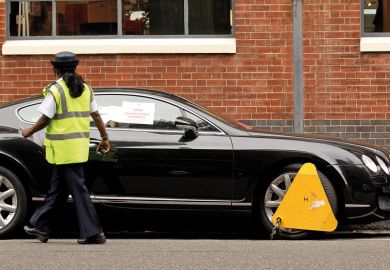American Economic Review this month retracted a paper that concluded that tax increases on French dividends also increased firms’ investment.
The retraction note says the authors did not tell editors about changes they made between when the journal conditionally accepted the paper and when it published it in September.
The paper was titled “Dividend taxes and the allocation of capital” – but now it has “retracted by the authors” appended to it on the journal’s website.
“The error in the rendering of the figure was not intentional,” the retraction note says. “The data and the code for the analysis are stored on remote, external servers that were inaccessible to the authors for prolonged periods of time during the publication process so it is unfortunately not possible to recover past versions to isolate the error’s origin.”
The note says it’s “By Adrien Matray”, an author and a non-tenured Princeton University assistant economics professor, “and Charles Boissel”, the other author, who is no longer in academe and was not part of the project when the mistakes were made.
But Dr Matray, while he doesn’t contest the “coding error”, said he didn’t request the retraction his own name is on. Retraction Watch reported earlier on the situation.
In an email to Inside Higher Ed, Dr Matray wrote that Erzo Luttmer, the journal’s editor, decided to retract it.
“He asked me to draft a retraction notice that explained the reasons for retraction, and I did so because I was not informed that the editor would present the retraction as my decision,” Dr Matray wrote. “I re-visited the paper and found almost identical results using a different method. I requested that the editor reconsider his decision based on the results and the COPE [Committee on Publication Ethics] guidelines.”
He said he pushed for the journal to instead publish a correction and “evidence showing that the error did not substantially impact this one result (which was one out of many results)”. He asked to be allowed to publish a reply to the French researchers who had criticised the paper and its findings, he said, but Professor Luttmer also refused this.
Professor Luttmer, who is also the Dartmouth professor in economics at Dartmouth College, wrote in an email that he is travelling overseas and could not provide an interview, but he wrote that “it is for the authors to explain why they wrote the retraction notice if they didn’t agree with the retraction.”
Steve Stelling, the journal’s managing editor, referred questions to the American Economic Association, which publishes the journal. The association provided Inside Higher Ed access to the retraction note and the retracted paper, but it did not comment.
Also this month, the journal published the “comment” by the four French researchers who found errors. These researchers argue the errors undermine the paper’s results.
“Our results thus suggest that, contrary to BM’s [Boissel and Matray’s] claim, one cannot conclude that the dividend tax increase in France in early 2013 had any positive effect on companies’ investment,” they wrote.
“Using the same data and code as BM, we show that its estimation of the investment impact of the French dividend tax hike suffers from an alteration, is very sensitive to the choice of controls, and, as a result, does not provide clear evidence that dividend taxes encourage investment,” they wrote.
Laurent Bach, associate professor of finance at ESSEC Business School in France, told Inside Higher Ed on Wednesday that it is part of “folk wisdom of applied econometricians that you have to be careful when doing these things”.
“You have to, in particular, check that when you do a simpler version of the exercise you still find the effect,” Dr Bach said.
“There was no simple version of the exercise, only a complex version, and in our comment when we looked at the published paper we thought, OK, maybe we want to look at a simpler version,” he said. He said they went into the published code and found things there that weren’t documented, or weren’t documented clearly, in the text, “which were having a very substantial impact on the results”.
Dr Matray has published rebuttals to these claims on his website. “Both errors were unintentional and made in good faith,” he wrote there. “I have revisited the paper, and neither error changes any of its conclusions.”
This is an edited version of a story that originally appeared on Inside Higher Ed
Register to continue
Why register?
- Registration is free and only takes a moment
- Once registered, you can read 3 articles a month
- Sign up for our newsletter
Subscribe
Or subscribe for unlimited access to:
- Unlimited access to news, views, insights & reviews
- Digital editions
- Digital access to THE’s university and college rankings analysis
Already registered or a current subscriber?








